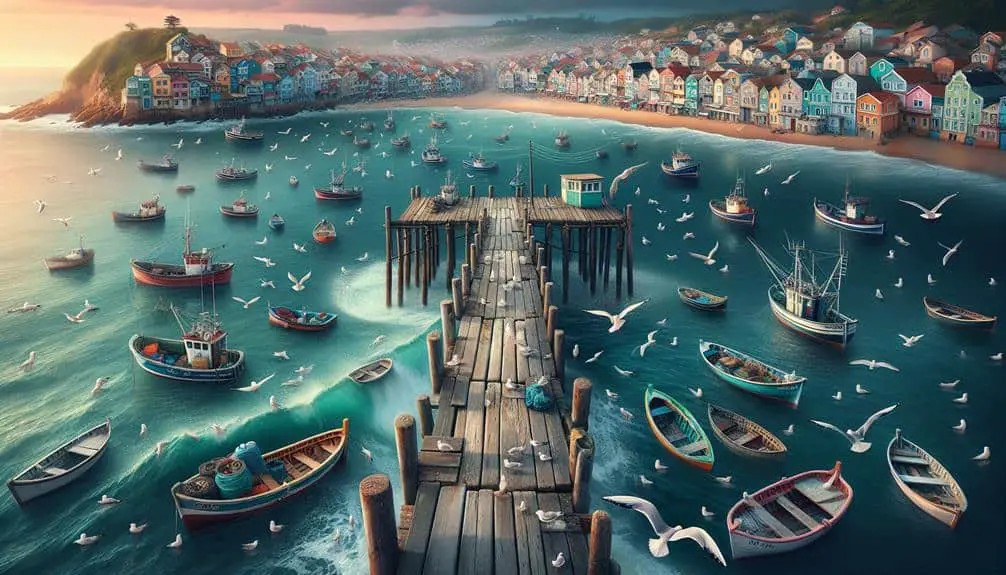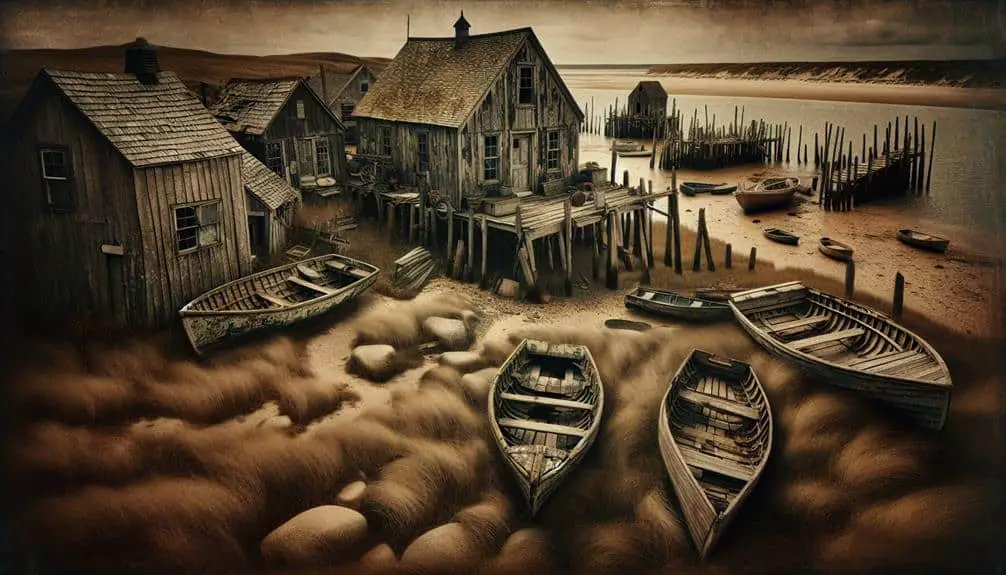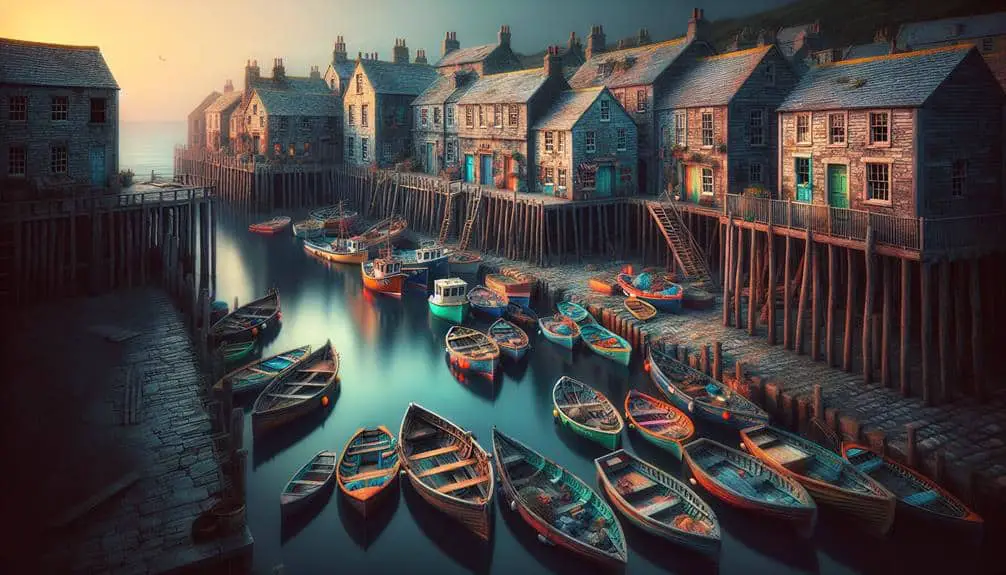Explore 7 must-visit coastal fishing heritage sites in the US. Discover New Bedford, Massachusetts, a top fishing port with a blend of modern practices. Astoria, Oregon, offers a historic Cannery and well-preserved sites. Apalachicola, Florida is the Oyster Capital with a rich maritime heritage. Rockport, Texas, boasts fishing tournaments and cultural heritage. Gloucester, Massachusetts, is a historic seaport with enduring traditions. Morro Bay, California, has a thriving fishing tradition and picturesque harbor. Port Clyde, Maine, showcases a rich maritime history and lobster fishing cornerstone. Uncover the vibrant tapestry of cultural heritage and modern fishing practices at these sites.
Key Points
- New Bedford, Massachusetts: Top fishing port with rich maritime history and modern practices.
- Astoria, Oregon: Historic cannery, maritime museum, riverwalk, and preserved sites.
- Apalachicola, Florida: Oyster capital with sustainable fishing practices and rich heritage.
- Rockport, Texas: Fishing tournaments, local cuisine, cultural heritage, and abundant waters.
- Gloucester, Massachusetts: Historic seaport, fishing industry traditions, museums, and picturesque harbor.
New Bedford, Massachusetts
New Bedford, Massachusetts boasts a rich maritime history deeply intertwined with the coastal fishing heritage of the United States. The city played a significant role in whaling history, particularly during the 19th century when it was one of the world's most important whaling ports. Whaling expeditions from New Bedford were renowned for their importance and played an essential role in providing oil for lighting and lubrication worldwide.
In addition to its whaling history, New Bedford also has a strong foundation in commercial fishing traditions. The city's strategic location along the Atlantic Ocean made it a hub for fishing fleets, with a diverse range of species being harvested from the rich waters off its coast. Today, New Bedford continues to be one of the top fishing ports in the nation, showcasing a blend of modern fishing practices while exploring its historical roots.
Visiting New Bedford allows you to explore the intricate history of whaling and commercial fishing, offering a glimpse into the evolution of maritime industries and their impact on coastal communities.
Astoria, Oregon
Astoria, Oregon stands as a notable coastal fishing heritage site in the US, showcasing a rich history deeply rooted in maritime traditions. This historic town offers a glimpse into the past with its well-preserved Historic Cannery and engaging Maritime Museum.
Key Features of Astoria, Oregon:
- Historic Cannery: Explore the iconic Historic Cannery, which once buzzed with activity during the peak of the fishing industry. Witness firsthand the tools and processes that were integral to the canning of fish.
- Maritime Museum: Immerse yourself in the seafaring history of Astoria at the Maritime Museum. Discover fascinating exhibits detailing the town's maritime heritage, including shipwrecks, navigation tools, and the lives of fishermen.
- Riverwalk: Take a leisurely stroll along the Riverwalk and soak in the picturesque views of the Columbia River. Learn about the importance of this waterway to the fishing industry and the town's development.
- Local Cuisine: Indulge in fresh seafood delicacies at waterfront restaurants, savoring the flavors of the sea while overlooking the bustling harbor. Experience the culinary traditions that have been passed down through generations in Astoria.
Apalachicola, Florida
Apalachicola, Florida boasts a distinctive fishing community deeply intertwined with its coastal surroundings, embodying a unique blend of tradition and sustainability. Known as the Oyster Capital, Apalachicola's historic fisheries have been a crucial part of the region's identity for centuries. The Apalachicola Bay is renowned for its rich oyster beds, which have supported the local economy and culture for generations.
The waters of Apalachicola are teeming with a diverse array of marine life, providing ample opportunities for fishermen to harvest a wide variety of seafood. The region's fishing heritage is a tribute to the resilience and adaptability of the local community in the face of changing environmental and economic conditions.
Visitors to Apalachicola can witness firsthand the traditional fishing practices that have been passed down through the generations. From oyster harvesting to shrimp trawling, the techniques employed by local fishermen reflect a deep respect for the marine environment and a commitment to sustainable resource management. Apalachicola's historic fisheries offer a glimpse into a way of life that has endured for centuries, making it a must-visit destination for anyone interested in experiencing the rich maritime heritage of the Gulf Coast.
Rockport, Texas
Situated along the Gulf Coast, Rockport, Texas, embodies a rich fishing heritage deeply rooted in its coastal environment. The town's historical significance in the fishing industry makes it a must-visit destination for fishing enthusiasts. Here are some reasons why Rockport, Texas, stands out:
- Fishing Tournaments: Rockport is renowned for hosting various fishing tournaments throughout the year, attracting anglers from far and wide to compete in the abundant waters of the Gulf of Mexico.
- Local Cuisine: Indulge in the local culinary delights that showcase the fresh seafood caught right off the coast. From traditional seafood boils to gourmet seafood dishes, Rockport offers a diverse range of dining options that cater to every palate.
- Coastal Scenery: Immerse yourself in the picturesque coastal landscape of Rockport, where the tranquil waters meet the expansive skies, providing the perfect backdrop for a relaxing fishing experience.
- Cultural Heritage: Explore the town's museums and historical sites that celebrate its fishing legacy, offering valuable insights into the area's maritime history and the impact of fishing on the community.
Gloucester, Massachusetts
Rockport's vibrant coastal fishing heritage finds a parallel in Gloucester, Massachusetts, known for its longstanding fishing traditions and historical significance in the maritime industry. Gloucester stands out as a historic seaport with a rich legacy deeply rooted in the fishing industry. The town's economy has been shaped by centuries of fishing practices, making it a prime location for exploring the evolution of the fishing industry in the United States.
Gloucester's historic seaport offers visitors a glimpse into the past, showcasing the intricate network of docks, warehouses, and processing facilities that have supported generations of fishermen. The town's maritime museums provide a thorough overview of the fishing industry traditions, displaying artifacts, tools, and vessels that highlight the challenges and triumphs of Gloucester's seafaring community.
Immerse yourself in Gloucester's maritime history by exploring the picturesque harbor, where fishing boats still set out to sea each day, carrying on the town's age-old traditions. Experience the essence of a true fishing town as you witness the bustling activity along the waterfront, a tribute to Gloucester's enduring legacy in the fishing industry.
Morro Bay, California
Morro Bay, California, boasts a distinctive coastal fishing heritage characterized by its picturesque harbor and longstanding connection to the fishing industry. This historic harbor has been a hub for fishing activities for generations, attracting visitors with its charm and delicious local seafood.
Here are four reasons why Morro Bay is a must-visit coastal fishing heritage site:
- Fishing Tradition: Morro Bay has a rich history of fishing, dating back to the early days of settlement on the California coast. The traditional fishing methods and practices are still alive in the local community.
- Commercial Fishing Fleet: The harbor is home to a thriving commercial fishing fleet that brings in a variety of fresh catches daily. Witnessing the boats unload their hauls is a sight to behold.
- Seafood Restaurants: Indulge in the freshest seafood at the numerous restaurants lining the harbor. From clam chowder to grilled fish, the local cuisine is a delight for seafood enthusiasts.
- Coastal Scenery: Enjoy the stunning coastal views while exploring the harbor. The blend of fishing boats, sea lions, and the iconic Morro Rock in the background creates a picturesque setting for visitors to immerse themselves in.
Port Clyde, Maine
Port Clyde, Maine, is renowned for its historical significance in the maritime industry, particularly in the domain of coastal fishing heritage. The maritime history of Port Clyde dates back to the early 19th century when it emerged as an essential fishing village on the coast of Maine. Lobster fishing has been a cornerstone of the local economy for generations, with families passing down traditional fishing techniques and practices.
The town's maritime history is palpable as you walk along the docks and witness lobster boats unloading their daily catch. The Lobster Shack, a local favorite, offers visitors a taste of freshly caught lobster prepared in the traditional Maine style. The Maritime Museum provides a deeper insight into the evolution of lobster fishing techniques and the role of Port Clyde in shaping the industry.
Exploring Port Clyde's coastal fishing heritage allows you to immerse yourself in a rich tapestry of tradition and innovation that continues to thrive in this picturesque seaside town. Whether you're a history enthusiast or simply appreciate the beauty of coastal communities, Port Clyde offers a unique experience that celebrates the legacy of maritime history and lobster fishing.
Frequently Asked Questions
What Are the Best Times of Year to Visit These Coastal Fishing Heritage Sites for the Optimal Fishing Experience?
For the prime fishing experience at coastal fishing heritage sites, consider fishing seasons and weather conditions. Learn local fishing techniques and explore historical ships. Timing your visit during peak seasons guarantees a fruitful and immersive fishing adventure.
Are There Any Specific Local Traditions or Events Related to Fishing That Visitors Should Be Aware of When Visiting These Sites?
When visiting these coastal fishing heritage sites, be sure to immerse yourself in local festivals celebrating fishing traditions. Explore historical landmarks and witness traditional crafts. Familiarize yourself with cultural practices to fully appreciate the experience.
Are There Any Famous Local Dishes or Seafood Specialties That Visitors Must Try While Exploring These Coastal Fishing Heritage Sites?
When exploring these coastal fishing heritage sites, be sure to indulge in local delicacies like clam chowder, lobster rolls, and fresh oysters. Don't miss out on the vibrant seafood festivals that celebrate these culinary treasures.
Are There Any Guided Tours or Educational Programs Available at These Sites to Learn More About the History and Importance of Fishing in the Area?
Explore guided tours and educational programs at these coastal sites. Learn about fishing techniques, conservation efforts, historical significance, and cultural impact. Immerse yourself in the rich history and importance of fishing while gaining valuable insights.
What Are Some Nearby Attractions or Activities That Visitors Can Also Enjoy While Visiting These Coastal Fishing Heritage Sites?
While visiting these coastal fishing heritage sites, you can also enjoy nearby attractions. Relax at beach bonfires, explore scenic hikes. Immerse in local art, savor seafood festivals. Indulge in diverse experiences that complement your fishing heritage journey.



